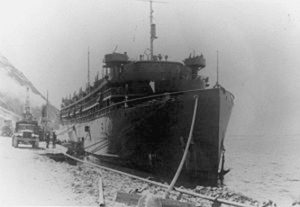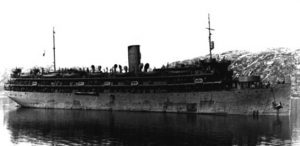 SS Dorchester was a troopship allocated to the US Army during World War II. She was one of three ships in a class built by Newport News Shipbuilding: the keel was laid on 10th September 1925 and she was launched on 20th March 1926. Handed over to Merchants and Miners Transportation on 17th July 1926, she could carry 302 passengers in First Class and 3,300 tons of cargo on a coastal service between Miami and Boston.
SS Dorchester was a troopship allocated to the US Army during World War II. She was one of three ships in a class built by Newport News Shipbuilding: the keel was laid on 10th September 1925 and she was launched on 20th March 1926. Handed over to Merchants and Miners Transportation on 17th July 1926, she could carry 302 passengers in First Class and 3,300 tons of cargo on a coastal service between Miami and Boston.
 She had been taken over by the US War Shipping Administration on 24th January 1942 and converted to a troopship: additional lifeboats and life rafts were fitted along with four 20mm guns, a 3-in 50-calibre gun forward and a 4-in 50-calibre gun aft. After conversion she could carry over 900 troops. She entered service in February 1942, still with her original captain and crew, plus a contingent of US Navy personnel to handle the guns and communications. However, she was not owned or chartered by the Army so was not officially classified as USAT. She sailed from New York on 23rd January 1943 heading for Greenland, in a convoy of three ships, SG-19, with an escort of three US Coast Guard cutters. In the early hours of 3rd February 1943, Dorchester was torpedoed off Newfoundland by the German submarine U-223, and she sank in around 20 minutes. The explosion was severe, with an immediate loss of all power and communications. One of the cutters, Escanaba, moved in and managed to save 133, and another cutter, Comanche, saved 97 of the 904 personnel aboard. The water was freezing cold and the air temperature just 34°F: many died from hypothermia. The sinking of Dorchester was the worst single loss of American personnel in any American convoy during the war and the third worst loss of life at sea suffered by the US.
She had been taken over by the US War Shipping Administration on 24th January 1942 and converted to a troopship: additional lifeboats and life rafts were fitted along with four 20mm guns, a 3-in 50-calibre gun forward and a 4-in 50-calibre gun aft. After conversion she could carry over 900 troops. She entered service in February 1942, still with her original captain and crew, plus a contingent of US Navy personnel to handle the guns and communications. However, she was not owned or chartered by the Army so was not officially classified as USAT. She sailed from New York on 23rd January 1943 heading for Greenland, in a convoy of three ships, SG-19, with an escort of three US Coast Guard cutters. In the early hours of 3rd February 1943, Dorchester was torpedoed off Newfoundland by the German submarine U-223, and she sank in around 20 minutes. The explosion was severe, with an immediate loss of all power and communications. One of the cutters, Escanaba, moved in and managed to save 133, and another cutter, Comanche, saved 97 of the 904 personnel aboard. The water was freezing cold and the air temperature just 34°F: many died from hypothermia. The sinking of Dorchester was the worst single loss of American personnel in any American convoy during the war and the third worst loss of life at sea suffered by the US.
However, Dorchester is best remembered for the four Army chaplains who gave up their lifejackets and their lives to help others survive, seeing many into the lifeboats. These were a Methodist minister, George Fox, a Reformed Church minister, Clark Poling, a Catholic priest, John Washington, and a Rabbi, Alexander Goode. When there were no more boats or lifejackets, they were seen to link arms, say prayers and sing hymns together. On 19th December 1944 all four chaplains were posthumously awarded the Purple Heart and the Distinguished Service Cross. Congress wanted to grant the Medal of Honor but the condition for that award required heroism when under fire. In honour of their sacrifice the US Congress later declared 3rd February to be established as “Four Chaplains Day”, and in 1960 a special medal for heroism, the Chaplain’s Medal, was created.
best remembered for the four Army chaplains who gave up their lifejackets and their lives to help others survive, seeing many into the lifeboats. These were a Methodist minister, George Fox, a Reformed Church minister, Clark Poling, a Catholic priest, John Washington, and a Rabbi, Alexander Goode. When there were no more boats or lifejackets, they were seen to link arms, say prayers and sing hymns together. On 19th December 1944 all four chaplains were posthumously awarded the Purple Heart and the Distinguished Service Cross. Congress wanted to grant the Medal of Honor but the condition for that award required heroism when under fire. In honour of their sacrifice the US Congress later declared 3rd February to be established as “Four Chaplains Day”, and in 1960 a special medal for heroism, the Chaplain’s Medal, was created.
